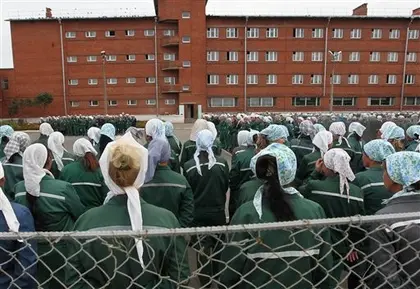Its backers hope the long-anticipated revisions, which came into effect on Nov. 20, will eliminate the worst abuses of the nation’s barbaric judicial and law enforcement systems.
The previous code, a Soviet holdover from the days of Nikita Khrushchev, was described by lawyers and human rights activists as “unbearably vile” and “disastrous.” But it’s not enough to change the law, advocates warn. The police, prosecutors and judges who enforce the law will have to change, too, and that could be the hardest part.
JOIN US ON TELEGRAM
Follow our coverage of the war on the @Kyivpost_official.
“Criminal legislation will definitely become more humanistic. The code can be rightfully called revolutionary for Ukraine,” said Mikhail Ilyashev, managing partner at Ilyashev & Partners Law Firm. “The most important is that it expands the rights and influence of attorneys and limits pretrial detention to exceptional cases.”
The code introduces bail, jury trials, the concept of house arrest, use of video conferences during investigation, settlements between suspects and victims approved by judges and other practices that are standard in the West, but novel for Ukraine.
More importantly, the code recognizes testimony only when it is given in the courtroom, eliminating the widespread practice of police forcing testimony out of suspects.
“According to our analysis, 80 percent of police abuse happens because police officers want to force people to confess. When they have the confession, they can base the whole case on it. This is not possible under the new code, which does not consider confessions as evidence in the pre-trial [stage of the] investigation,” said Volodymyr Oliynyk, a member of the pro-presidential Party of Regions, an author of the code.
The government is also set to hold law enforcement officials accountable for wrongdoing, which they rarely do in Ukraine. Out of 5,000 complaints about police abuse that Ukraine’s ombudsman received in 2011, few were investigated and only 10 police officers were prosecuted.
According to the code, a new body, the State Bureau of Investigation, is to be created to probe allegations of crimes by officials, law enforcement and judges.
Lawyers said they hope that the new code will increase the incredibly low 0.2 percent of acquittals in courts. The code stripped courts of their right to send back cases for re-investigation which was often done instead of issuing an acquittal.
Out of jail
The code is also expected to reduce the large prison population of 151,000 inmates in Ukraine, as it decriminalizes many economic crimes, changing the punishment from imprisonment to fines.
It also limits the term of pre-trial detention to 12 months for felonies and 6 months for petty crimes. More than 20 percent of all prisoners — 33,000 in all — are languishing in pre-trial detention, many with no trial date set. It’s not uncommon for prisoners to spend up to three years before court’s ruling.
Mykola Golodnyak, a Kyiv-based lawyer, said his three clients can be the first to be set free under the new code. “They have already spent 12 months in pre-trial. The prosecutor asked the court to prolong the detention, but was turned down because of the new criminal code coming into force,” Golodnyak said.
His clients are scheduled for release on Nov. 30.
Another person who the code might help is lawyer Oleg Nikolyshyn, who has spent almost two years in pre-trial confinement in a bizarre case. Nikolyshyn was defending a client who was accused of car theft. In turn, police opened a criminal case against Nikolyshyn, unlawfully, it turns out, since only high-ranking prosecutors can open a case against attorneys.
“I have been in pre-trial detention ever since. In jail I was diagnosed with leukemia that spreads fast,” Nikolyshyn said, as he sat on his bed in a prison hospital in Bucha, where he was transferred after his diagnosis. However, the prison hospital is unable to treat such a serious illness. Nikolyshyn’s case is in European Court of Human Rights. The next hearing on his case in Ukraine will take place on Nov. 30.

This case is one of the more than 20,000 cases that went to courts before the new criminal code took effect, and thus will be heard according to the old rules. But Nikolyshyn’s lawyer hopes he will be let go from pre-trial confinement because of the 12 month-limit set by the new code.
It is unclear how many prisoners will be affected by the new rules, said Ihor Andrushko, a spokesperson for State Penitentiary Service. “This is not an automatic process. We are executing decisions made by the courts and investigators in each case. They have to rule on the change from pre-trial detention to home arrest, for example,” Andrushko said.
He added that some procedures such as house arrest will require the purchase of electronic monitoring equipment before they can be used.
Some problems remain
The new law also has its share of flaws. Only registered attorneys are allowed to defend people in court. While the norm exists in many nations, in Ukraine this requirement means many people will not be able to afford a legal defense, since not enough attorneys do pro bono work. There are also not enough public defenders, lawyers who work for the government on behalf of indigent clients.
“The Institute of Advocacy in Ukraine is corrupt and loyal to the prosecutor. Most advocates make their living by taking bribes to the judge for softening the punishment or changing the article under which the person is prosecuted,” said Dmytro Groisman, head of Vinnytsya Human Rights Group.
And the use of juries in trials will be highly restricted.
“Only people accused of serious crimes that qualify for life terms can use the jury trial, according to the new code. The amount of such crimes is very small, so the procedure will not concern the vast majority of cases. By contrast, in developed countries, for instance in the USA, everyone accused of a crime punishable by at least six months in prison has the right to demand a jury trial,” said lawyer Artem Orel.
The role of the jury is further diminished, even in serious crimes, since the law makes it easy for the jury panel to be replaced by a judge.
But the human factor may remain the biggest problem.
“Previously, many violations were blamed on the outdated criminal code. Now, we have come close to the main problem with legislation – the people. Judges, detectives, investigators, prosecutors and others have all remained the same,” Groisman said.
Nikolyshyn agreed.
“The (criminal justice) system has to be changed – and the system is the people in uniform, who do not want to change,” Nikolyshyn said. “Without this, nothing will work,”
Kyiv Post staff writer Svitlana Tuchynska can be reached at [email protected]
You can also highlight the text and press Ctrl + Enter




